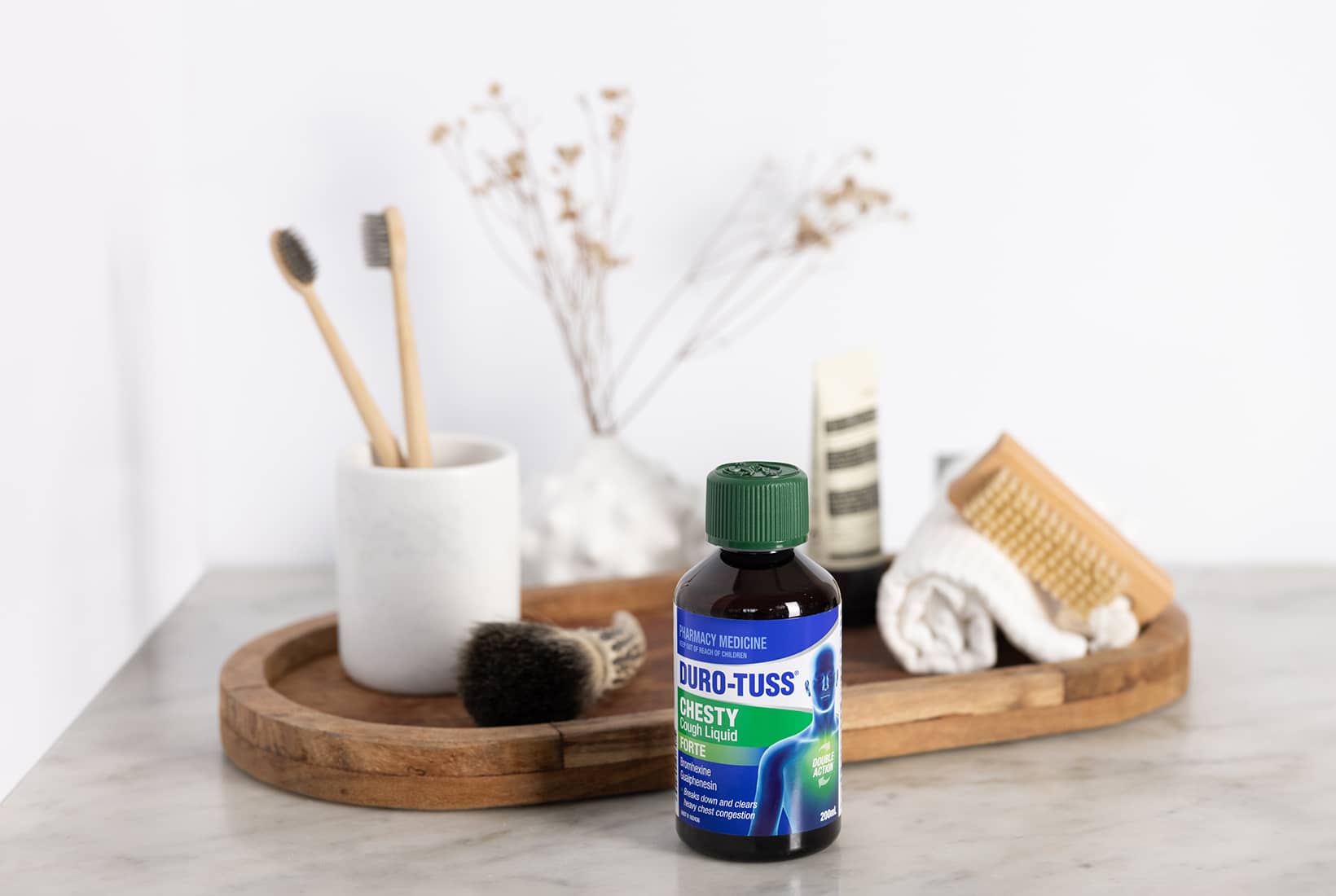
Chesty Coughs
Common causes for chesty coughs
We all cough. It’s perfectly normal. Coughing is a reflex action that your body uses to help keep your airways clear – that’s your nose, throat, windpipe (or trachea, if you want to be all scientific), and lungs. So coughing helps to protect your airways from things that could irritate them, such as accidentally inhaling bits of food or breathing in cigarette smoke.
But you know that deep, hacking cough when you feel like you’ll cough up a lung? The kind that comes with a heavy, congested feeling in your chest and sometimes even produces some nasty gunk? That’s a chesty cough – this type of cough is your body’s way of trying to clear out mucus from your lower airways. A chesty cough can really slow you down and get in the way of living your best life.
So what causes a chesty cough? Chesty coughs develop when your body produces more mucus than normal. This often happens when you get a respiratory tract infection – you know, those pesky illnesses that cause the common cold and flu. These infections are usually caused by viruses that make your airways inflamed and increase mucus production, and – you guessed it – they can lead to a chesty cough as your body tries to get rid of all that extra mucus from your chest. This is why a chesty cough is often called a ‘productive’ cough.
Treatment options for chesty coughs
When you’re dealing with a chesty cough, it’s nice to know that you can find relief from your symptoms with over-the-counter medicines, helping you get on with your day. For chesty coughs, look for products that help to break down and loosen the mucus in your airways, making it easier to cough it up and clear it out. Two key ingredients to look out for are called mucolytics and expectorants. Mucolytics work to break down and liquify the mucus, while expectorants loosen the mucus, making it easier to cough up.
To help switch off your cough, explore the DURO-TUSS range for chesty coughs.
- DURO-TUSS Chesty Cough Liquid Double Strength 200 mL: Contains double-strength bromhexine hydrochloride to break down stubborn chest congestion
- DURO-TUSS Chesty Cough Liquid Forte 200 mL: Contains bromhexine hydrochloride plus the expectorant guaiphenesin to break down mucus and clear heavy chest congestion
What about when you want a convenient alternative to liquids? Well, DURO-TUSS has you covered! Try DURO-TUSS Chesty Forte Cough Tablets when you need a double action formula to break down and expel mucus from the chest and Chesty Cough Lozenges in Lemon or Berry flavour to clear chest congestion with an added antibacterial to help relieve a sore throat.
Always read the label and follow the directions for use.
Natural remedies for chesty coughs
Chesty coughs associated with respiratory tract infections can take a few weeks to clear up, so it’s important to take care of yourself while you get back to normal. Here’s some things you can try to help relieve your symptoms in the meantime:
- Get plenty of rest
- Drink adequate amounts of fluids to stay hydrated
- Take a hot shower or bath – the steam may help loosen your mucus
- Consider hot drinks with honey to help soothe your throat and cough
While most chesty coughs clear up on their own within 3 weeks, you should see a pharmacist or medical professional if:
- Your cough lasts more than 3 weeks
- Your cough gets worse or is troubling you
- You have difficulty breathing, cough up blood or experience chest pain
- You have any other worrying symptoms
- You are caring for a child with a chesty cough.
If you have cold and flu symptoms follow health advice. For the most up-to-date information, please visit https://www.health.gov.au/health-alerts/covid-19
Chesty cough FAQs
You should see a doctor if your cough lasts for more than 3 weeks or gets worse, or if you experience any troubling symptoms such as difficulty breathing, chest pain, or coughing up blood.
Consider taking a cough medicine that contains a mucolytic (breaks down mucus) or an expectorant (loosens mucus) to help your body clear out the excess mucus in your airways.
A chesty, or ‘productive’, cough is your body’s way of trying to clear excess mucus from your lower airways.
Try propping your head up with an extra pillow or raising the head of your bed to help prevent mucus pooling in the back of your throat which can trigger coughing.
Mucolytics such as bromhexine are considered suitable to use during pregnancy. However, always speak with your doctor to make sure a product is suitable for you.
AU-2021-05-0045
